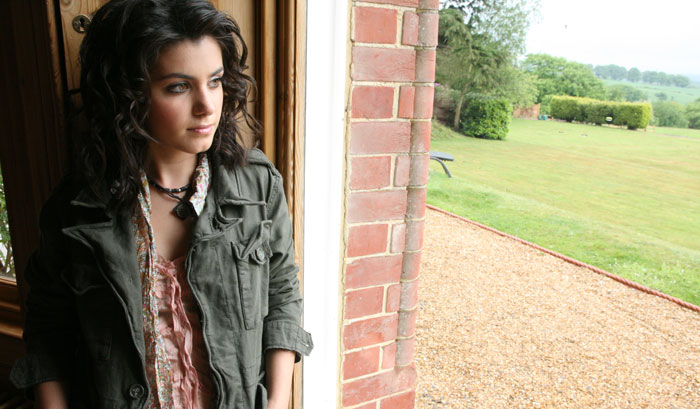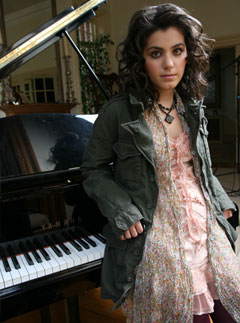


One of Britain's most promising--and successful--young artists, Katie Melua bucks the trend toward prefab pop chanteuses. A native of the former Soviet country of Georgia, she charts an unlikely path through the kind of jazzy folk-pop terrain once trekked by iconoclasts like Nina Simone and Joni Mitchell.
Melua's first two albums, Call Off the Search and Piece by Piece, have achieved multi-platinum status in many markets. She was Britain's highest-selling female artist of 2004 and 2005, as well as being Britain's highest-selling female artist worldwide in 2006. A gifted nylon-string guitarist and pianist, Melua recently released a new album, Pictures, which she describes as leaner and meaner than her first two recordings.

How has your songwriting process evolved since you started making records?
I feel like I have a stronger grasp on what I'm doing. Before, I'd just let the song come out, and then I'd be afraid of changing anything--words or music. After a few years of doing it, I've realized that the songwriting process is as much about rewriting as it is writing. You simply can't be afraid to go back and fix the things that bother you. There's a point at which you finally begin to judge for yourself what works and what doesn't. Perhaps that's what makes you a good songwriter.
Do you prefer a spontaneous feel on performances in the studio?
We try to stick to as many original takes as we can, but I'm also trying to be more open to studio technology. You can be as creative with the studio as you can be with any instrument. I'm enjoying using delays on my voice, and layering vocals in interesting ways. So while capturing that organic live sound is still our main philosophy, we're trying some things that break away from that as well. Too much studio cleverness can sometimes come across as contrived. But if what you're doing has a real artistic purpose, I think it will always come across.
You play piano beautifully, but isn't guitar your main instrument?
Oh, absolutely. I wouldn't call myself a piano player at all. I'm mainly a guitarist, and I do most of my writing on guitar. But I do play some piano live, and I have been writing quite a lot of songs on the piano. What I love about the piano is that it doesn't fall quite so easily under my fingers, and that lends itself to songs that are quite different from what I would write on the guitar.
Which pianos do you use in concert?
I use Yamaha C3 grand pianos, which sound absolutely brilliant, and at home I have a lovely Yamaha P250 stage piano. It feels exactly the same as a grand piano, which for me is the main criterion. With the P250 you can close your eyes and it's just like you're playing a real grand.
Your instrument is what you express yourself with--if you love it, it loves you back and gives you wonderful things in return.
You prefer nylon-string acoustics, like your spruce-top, mahogany-neck Yamaha GCX31C.
I suppose nylon-string guitars are what most people start out with, but then they often switch to steel-strings. Unfortunately, every time I've tried to "graduate" to a steel-string, I've never been happy with the sound. I've always preferred the warmth of the nylon strings. Yamaha offered to make me a guitar, and when they asked what color I wanted, I said blue. It's nice to have your favorite guitar in your favorite color! I've gotten some good new songs out of it already, so that's a good thing. Your instrument is what you express yourself with--if you love it, it loves you back and gives you wonderful things in return.
You mix so many styles: pop classical, vocal jazz, dreamy folk. How do you go about pinpointing Katie Melua-Land?
I try to let the songs dictate where they'll go, but once you're in the studio, the question of genres is as much down to production as anything. You just have to write words and find melodies that suit those words, and if that happens to be best communicated through a fast song or a slow song, that's how it has to be.
The truth is, I find it difficult to see myself as entirely of any one genre, but perhaps that's because I don't think there's any such thing as a "bad genre." I love them all, and I don't think one should be scared to meddle with all of them. I've often been criticized for that; it's seen as a negative thing that my music is "scattered," or that you can't put on my records and listen to them in one frame of mind. I suppose I am trying to find my voice in that way, while also keeping what's unique about each particular song. I'm not quite sure I know where Katie Melua-Land is yet--I wish I did!
(Photography Credit: Pat Pope)
























